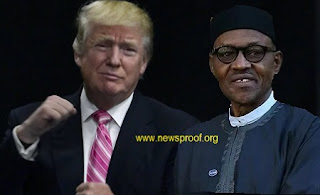By Dansu Peter
President Muhammadu Buhari has yet again broken a new ground by being the first African to be hosted by the United States President, Donald Trump in the White House
President Muhammadu Buhari has yet again broken a new ground by being the first African to be hosted by the United States President, Donald Trump in the White House
A report by Atlantic Council says Nigerian President Muhammadu Buhari will on April 30 hold the distinction of becoming the first African president to meet US President Donald J. Trump at the White House in Washington.
“I think it sends a very good signal that the first African head of state to have an Oval Office meeting will be the democratically elected president of Africa’s most populous country and its largest economy,” said J. Peter Pham, director of the Atlantic Council’s Africa Center.
The two leaders are expected to focus on security and economic issues.
On security, Nigeria has been battling the Boko Haram insurgency in the northeast of the country for almost a decade. The group was behind the kidnapping of more than 200 schoolgirls in Chibok in 2014 as well as the abduction of more than 100 from Dapchi in February 2018.
On economics, the Buhari government has taken great strides in turning around the economy of Africa’s largest country. China, which has a large footprint on the continent, is the top investor in Nigeria—a fact that should get Trump’s attention.
US-Nigerian security cooperation was strained under former US President Barack Obama.
On a visit to Washington in 2015, Buhari said that he had urged the Obama administration to provide Nigeria “counterterrorism with minimal strings.”
The Obama administration did not as it claimed it was prohibited by the Leahy laws, which bar providing US military assistance to specific individuals and units of foreign militaries that have been credibly accused of committing human rights abuses. The State Department at the time concluded that both Boko Haram and the Nigerian military had committed atrocities. Some Nigerian troops, specifically, were accused in a State Department report of committing extrajudicial killings, torture, rape, arbitrary detention, and widespread violence.
Acknowledging these human rights concerns, Pham, who is also vice president for research and regional initiatives at the Atlantic Council, said: “I would make the argument not to allow the best to be the enemy of the good.”
“Absent clear evidence of a systematically abusive regime, moral preening is of little utility in dealing with situations like this,” he added.
Trump, in contrast, has pushed ahead with military cooperation with Nigeria.
In 2017, the Trump administration approved the sale to Nigeria of twelve military planes and security equipment worth $600 million.
Pham favors such engagement.
“Do we get engaged and help shift our Nigerian partners in a more positive direction or risk them going elsewhere as they have in the past?” he said.
Buhari, a 75-year-old former general who was elected president in 2015, has announced that he will seek a second term in elections next year.
Trump has also sought to improve relations with African countries which he allegedly referred to in derogatory terms in January. In March, Trump’s top diplomat, Rex Tillerson, only spent a few hours in Nigeria as he was forced to cut short a trip to Africa. Trump fired Tillerson on his return.
Pham said the Trump-Buhari summit provides an important opportunity to reset the United States’ relationship with Nigeria.
Culled From: Atlantic Council


No comments